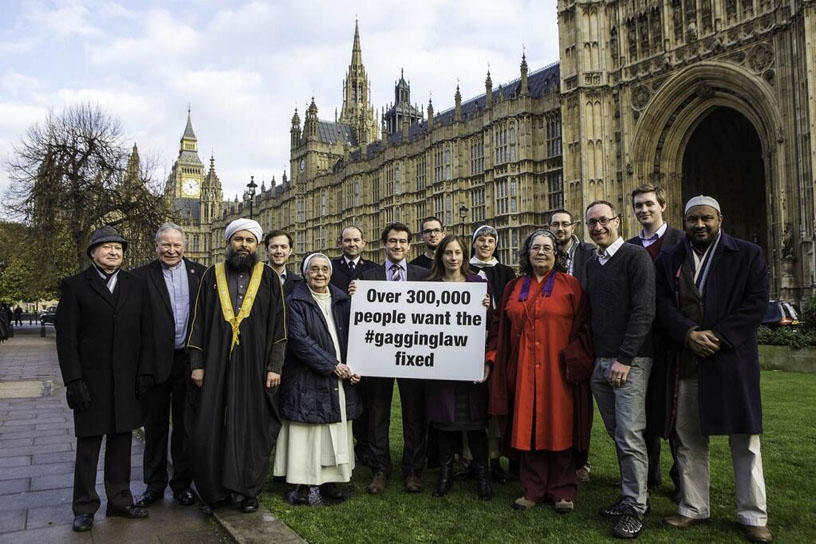Charities warn government policies damage democracy
In National Democracy Week, 2–8 July, Quakers in Britain have joined not-for-profit organisations urging the government to ditch policies that are silencing civil society groups.

In an open letter to Culture Minister, Matthew Hancock, the organisations say the Lobbying Act is limiting the ability of charities to campaign and advocate on behalf of those for whom they work.
Eleven not-for-profit organisations, including Friends of the Earth, Quakers in Britain, Amnesty International and ActionAid, have urged the government to protect our democracy from its own damaging policies.
Recent research by the Sheila McKechnie Foundation found that 51% of organisations reported that the Lobbying Act affected their ability to achieve their organisational mission or visions, and that the Lobbying Act is leading to the loss of voices of experience in political debate.
The full text of the Open Letter follows:
Secretary of State for Digital, Culture, Media & Sport
Dear Secretary of State,
Re: A joint letter from civil society groups regarding threats to our democracy
We are writing this open letter to you in National Democracy Week, a time during which the government plans to “celebrate progress and champion future democratic participation". This is an issue we feel strongly about. As you have rightly pointed out “the greatest social and political changes in our history have come about because independent people formed associations to press for change", and this is the very essence of civil society. While we welcome the government's recent Civil Society Strategy consultation, we are concerned over the lack of recognition, or engagement with, the issues civil society groups are facing. In particular, successive governments have enacted measures which limit the ability of charities to campaign and advocate on behalf of those for whom they work.
[QUOTE-START]
Silencing organisations that represent the most vulnerable in society is a fundamental threat to democracy.
- Charities' letter to Culture Minister
[QUOTE-END]
We have also witnessed successive governments enacting legislation and using rhetoric that has undermined the ability of charities, and other civil society organisations, to speak out, while simultaneously reducing the public's trust in organisations from the not-for-profit sector. Silencing organisations that represent the most vulnerable in society is a fundamental threat to democracy. It is an issue that we feel compelled to highlight during National Democracy Week.
You have praised “the individuals and groups - often in areas of significant disadvantage - who hold their communities together, doing everything from visiting the elderly to running the youth club". Yet the government has refused to address the impact of measures which are preventing organisations from speaking out on the issues that lead to these disadvantages. A recent report by the Sheila McKechnie Foundation found that the Lobbying Act reduces the ability of organisations to represent issues affecting their beneficiaries and enable supporters to engage in political debate, as well as reducing the ability of charities and voluntary organisations to support local democratic engagement. This is not limited only to the Lobbying Act. Recently we have seen anti-advocacy clauses placed on organisations that have received funds raised from the Tampon Tax. These clauses state that they cannot use the funds to engage in “advocacy", “appeals" and “campaigning and awareness raising".
[QUOTE-START]
Charities are the eyes, ears and conscience of any society; advocacy is a central part of their work and a sign of a healthy democracy
- Lords' select committee on charities
[QUOTE-END]
In its recent inquiry the House of Lords Select Committee on charities stated that “Charities are the eyes, ears and conscience of any society; advocacy is a central part of their work and a sign of a healthy democracy". Your consultation asked how civil society can be supported “to have a stronger role in shaping government policy". Our answer is by removing the ties which constrain us when we seek to do so.
The Civil Society Strategy consultation must be seen only as a first step in a conversation that seeks to rectify this worrying trend. It is vital for democracy that we have a robust civil society, and we ask that the government works to revitalise this.
Best wishes,
Craig Bennett Chief Executive, Friends of the Earth
Asad Rehman Executive Director, War on Want
Sarah-Jayne Clifton Director, Jubilee Debt Campaign
Paul Parker Recording Clerk, Quakers in Britain
Allan Hogarth Head of Advocacy & Programmes, Amnesty International
Claire Godfrey Head of Policy and Campaigns, Bond
Rita Chadha Interim Director, Migrants' Rights Network
Alice Bell Director, 10:10 Climate Action
Nick Dearden Director, Global Justice Now
Sophie Neuburg Executive Director, Medact
Stuart Eke Deputy Director of Advocacy, ActionAid UK